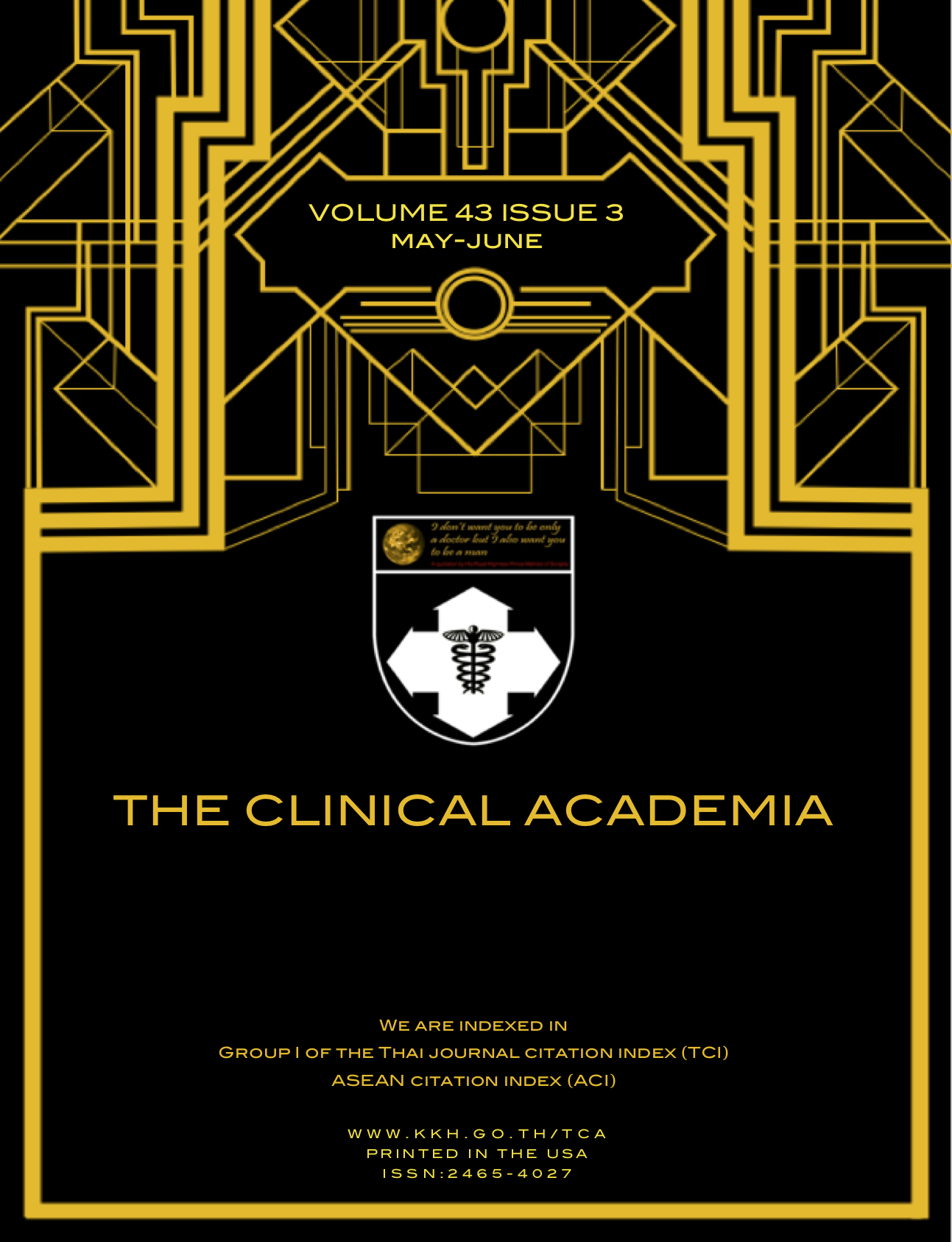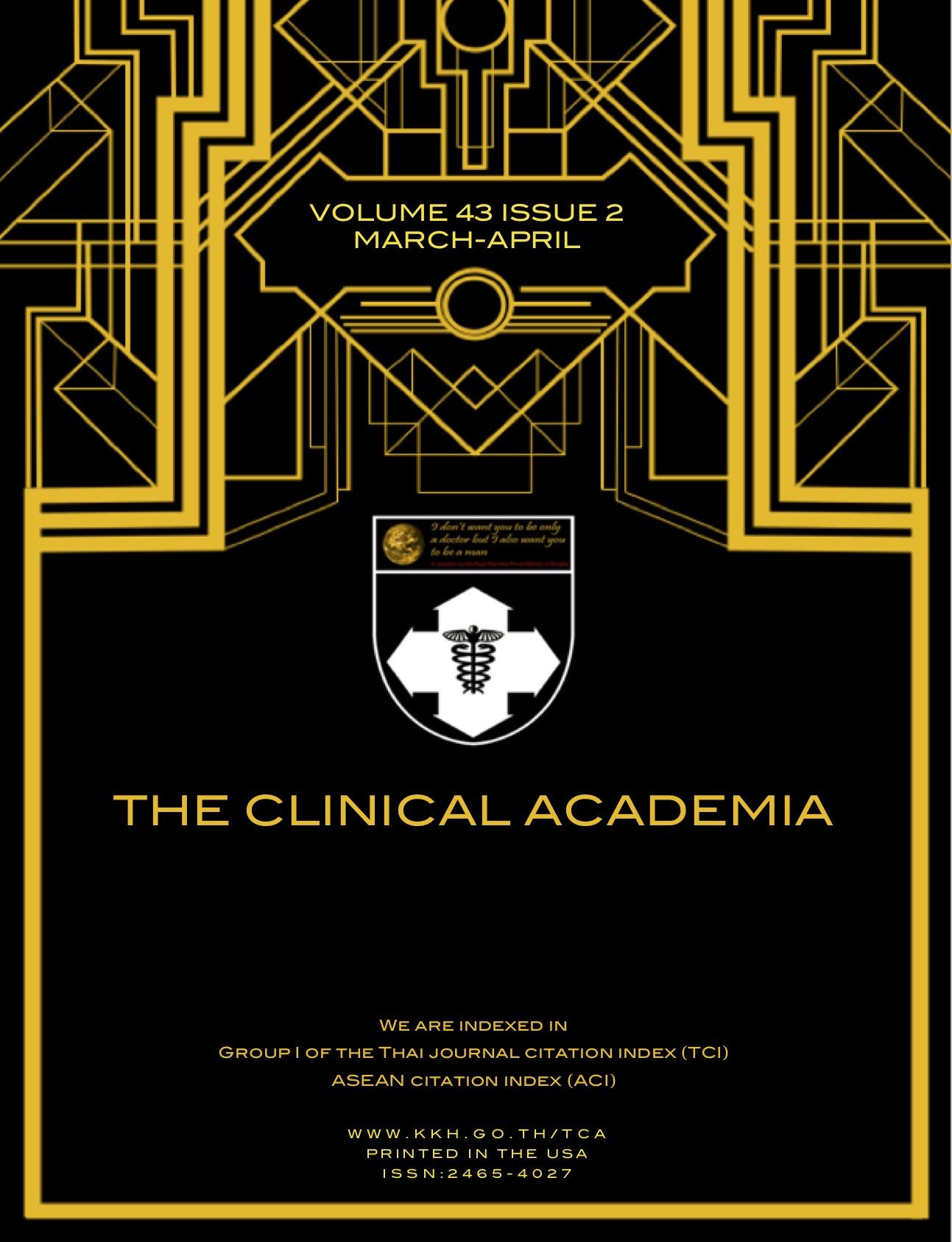ฉบับย้อนหลัง - หน้า 2
-
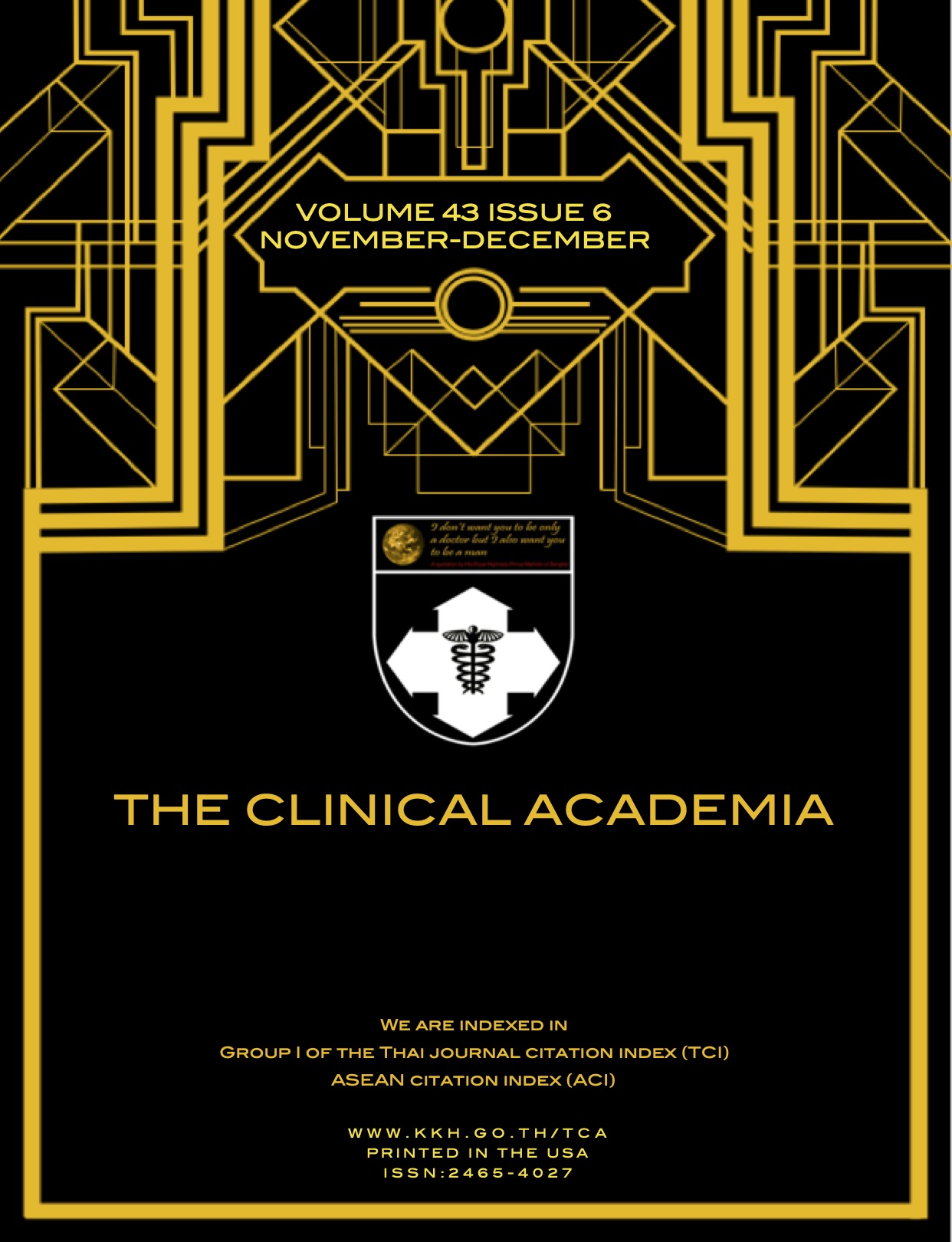
NOVEMBER-DECEMBER
ปีที่ 43 ฉบับที่ 6 (2019)Dear readers,
I hope this message finds you well and welcome you all to the last issue of volume 43. In this issue, you will have a chance to read the academic article about cloud computing assisting learning. The system that is now growing dramatically in medical education and other disciplines. Moreover, there are also two interesting articles about the advancement of laboratory techniques and palliative care. We wish you enjoy reading our journal as usual.Enjoy!
Thammasorn Jeeraaumponwat, M.D., Ph.D. Editor-in-Chief of The Clinical Academia
-
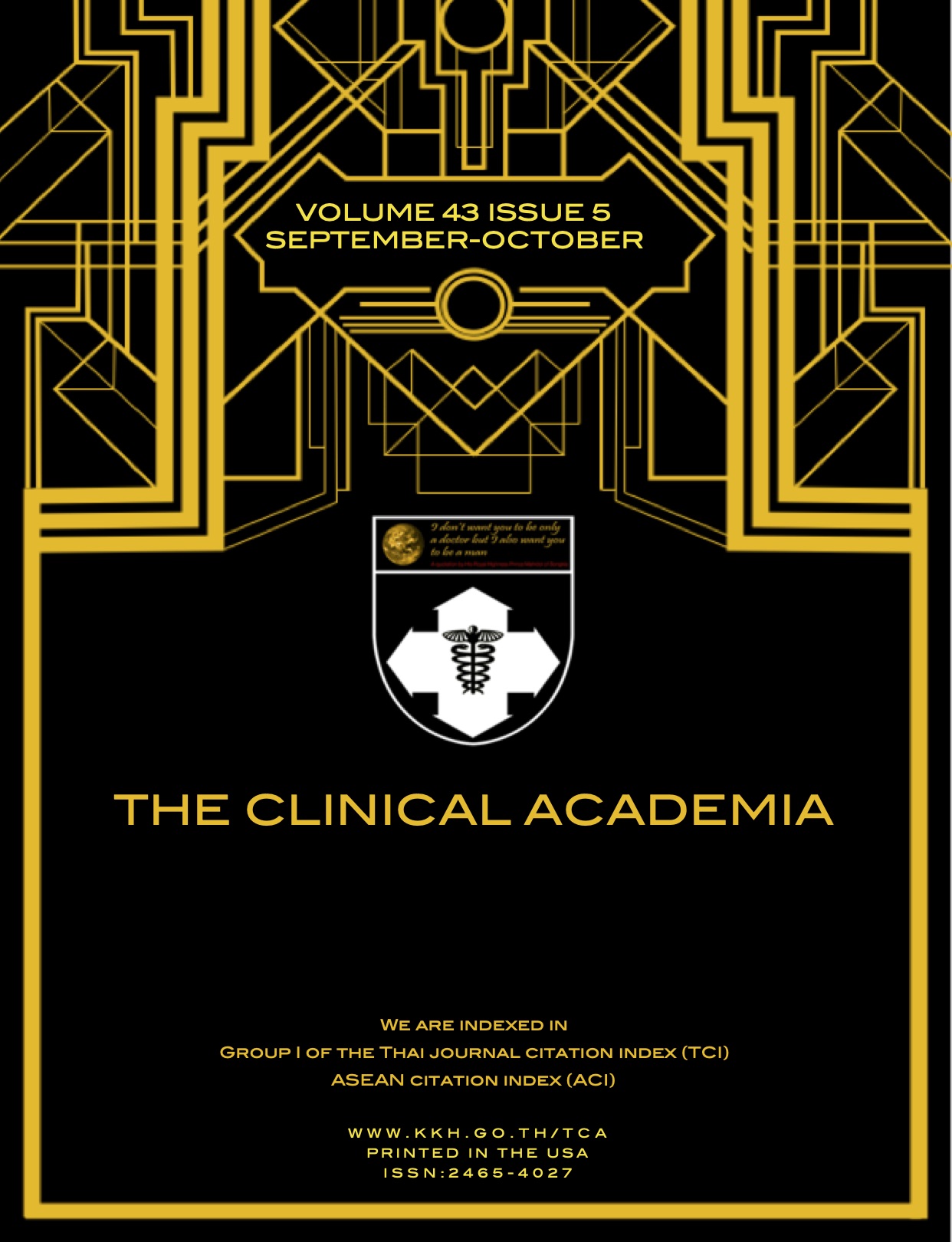
SEPTEMBER-OCTOBER
ปีที่ 43 ฉบับที่ 5 (2019)Dear readers,
We hope you enjoy reading articles from our journal as usual. In this issue, we have very informative four articles. You will learn about the benefit of using systemic corticosteroids on mortality in patients with acute infectious encephalitis. You will also get information about factors associated with postoperative pain after cesarean in pregnant mothers as well as risk factors for acute perforation of the appendix. We also have a very interesting systematic review regarding the use of peritubal bupivacaine infiltration for postoperative pain reduction after percutaneous nephrolithotomy. I hope you get something news as usual.
Enjoy!
Thammasorn Jeeraaumponwat, M.D., Ph.D.
Editor-in-Chief of The Clinical Academia
-
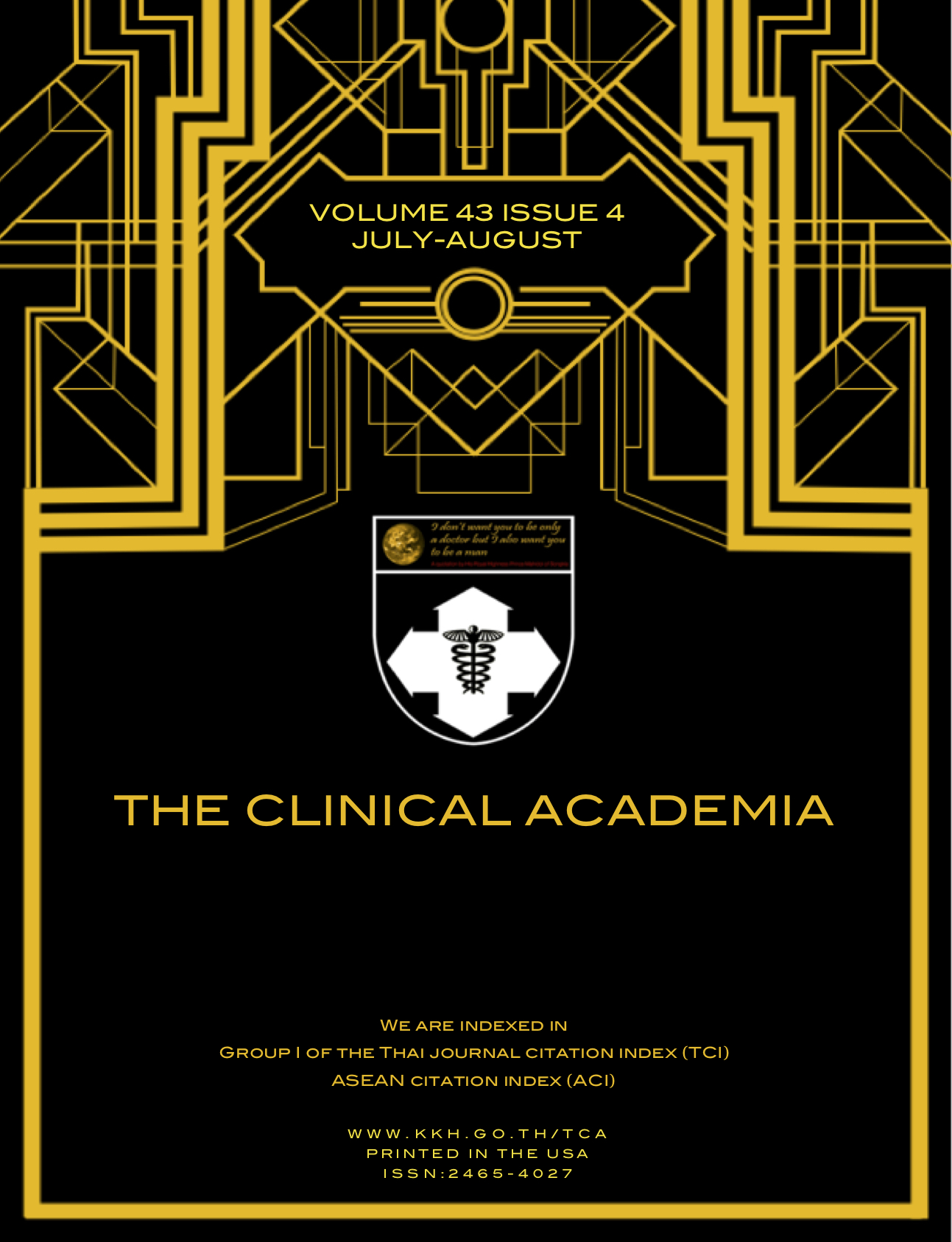
JULY-AUGUST
ปีที่ 43 ฉบับที่ 4 (2019)Dear readers,
It is my pleasure to welcome you to our TCA volume 43, issue 4 for July-August 2019. In this issue, we would like to present you with three interesting and practical systematic reviews; the first review is about comparing systemic corticosteroids versus nonsteroidal anti-inflammatory drugs for acute gout. The second is about using oral acyclovir for treating of pityriasis rosea and the last one is about the treatment of aphthous stomatitis using silver nitrate cauterization for. Hope you all gain somethings reading our articles.
Enjoy!
Thammasorn Jeeraaumponwat, M.D., Ph.D.
Editor-in-Chief of The Clinical Academia
-
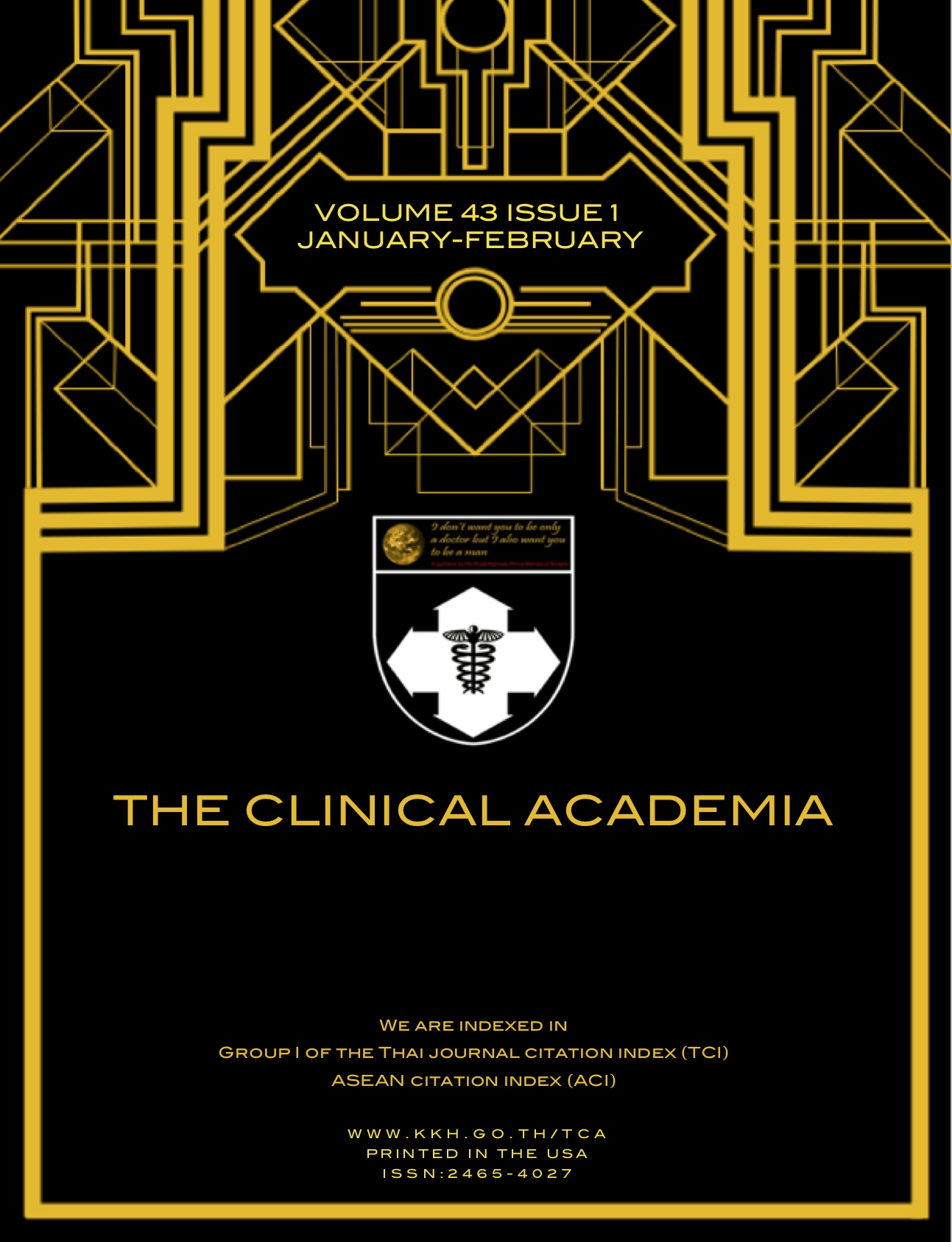
JANUARY-FEBUARY
ปีที่ 43 ฉบับที่ 1 (2019)This issue is going to be the first for our 43rd volume. We would like to start our new volume with two systematic reviews and a retrospective cohort. If you want to know the new treatment for head lice. I strongly suggest the first article in this issue. You will also find the answer regarding effects of oxytocin in different solutions on cord plasma bilirubin. Our last article in this issue is about sites of cord insertion and delayed the third stage of labor in spontaneous delivery. Medicine never stops, just like all of us. So keep moving, keep reading. We hope you enjoy reading our journal. Good luck.
Thammasorn Jeeraaumponwat, M.D., Ph.D. Editor-in-Chief of The Clinical Academia
-
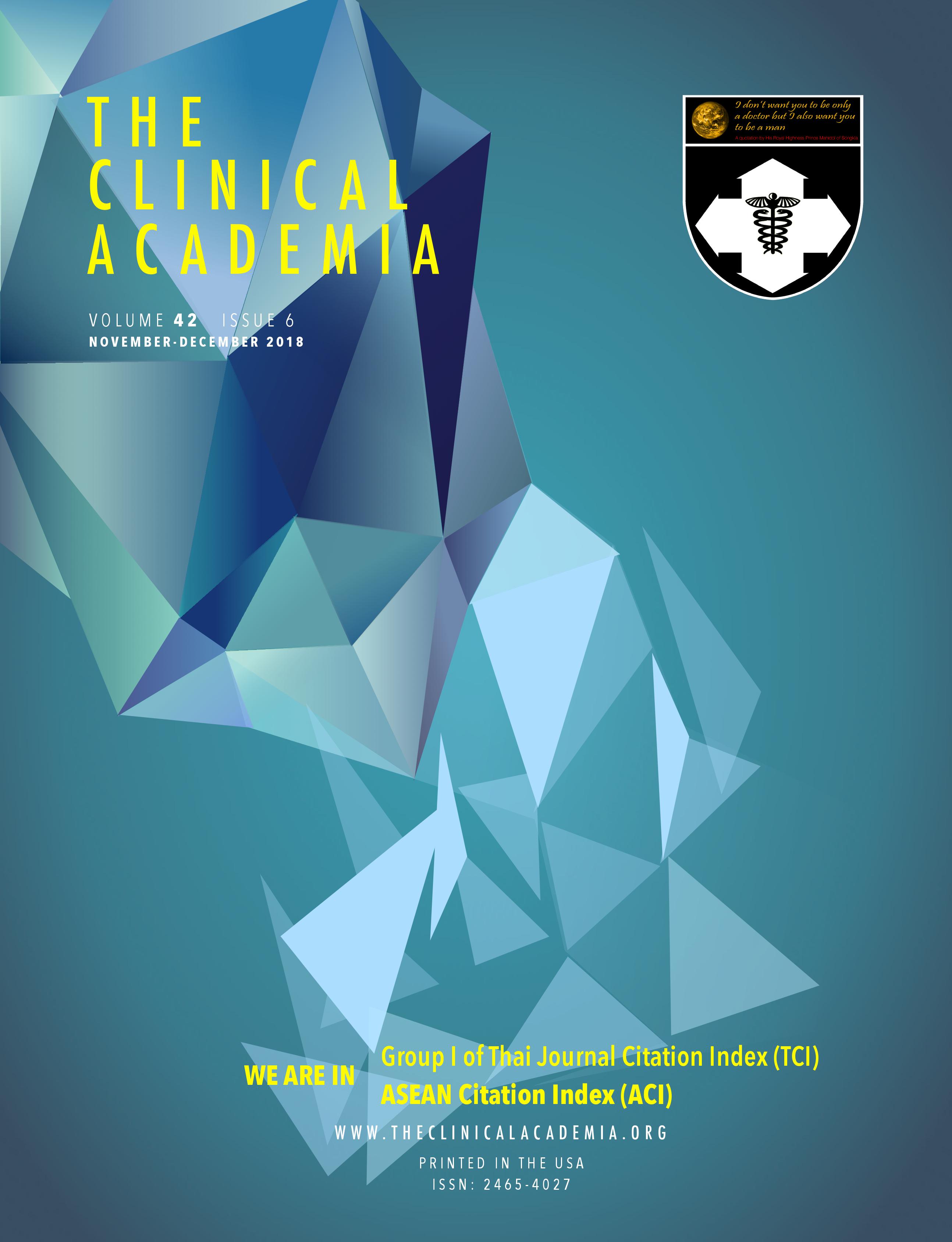
NOVEMBER-DECEMBER
ปีที่ 42 ฉบับที่ 6 (2018)This issue is going to be the last for our 43rd volume. Of course, the last but not least, in this issue, you will find two original articles regarding laboratory investigation, one is very innovative for diagnosis of the cervical squamous cell carcinoma and another is about using the expired CLO test for diagnosis of H. pylori infection which the knowledge can be transfer to the resource-limited setting. We also have two systematic reviews in this issue as well. These are from doctors once there were medical students at Khon Kaen Medical Education Center, Thailand. Aside from new information they generate, this is also the evidence proving the ability of medical students to synthesize knowledge and make a contribution to medical society.
-
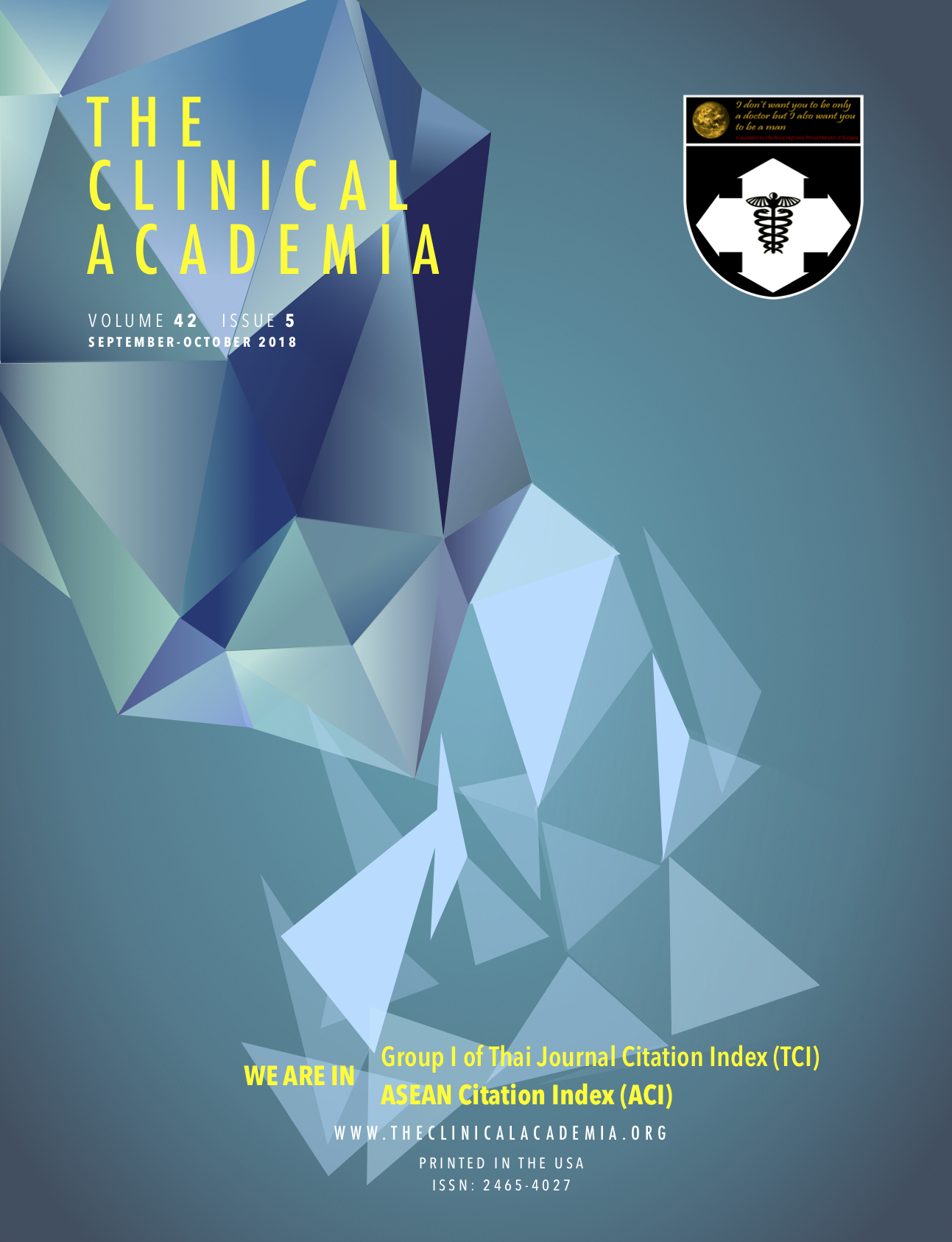
SEPTEMBER-OCTOBER
ปีที่ 42 ฉบับที่ 5 (2018)The systematic review is now considered as a source of reliable information. It can be large including a lot of trials or very small including no trial. It can be also very rigid to answer a specific clinical question or pragmatic to answer common problems we face in everyday life. In this issue, you will find three systematic reviews answering the common clinical questions; the common medication we used to reduce heart rate before undergoing computed tomography angiography, which one is better; or bladder infusion versus standard catheter removal in those with urinary retention, which one is superior; or flunarizine and betahistine in patients with vertigo, which one is recommended. Moreover, there is also an article exploring the myth of using acetazolamide in children with meningitis with increased intracranial pressue. All the answers can be found in this issue. Find them out yourself. Enjoy!
Thammasorn Jeeraaumponwat, M.D., Ph.D. Editor-in-Chief of The Clinical Academia
-
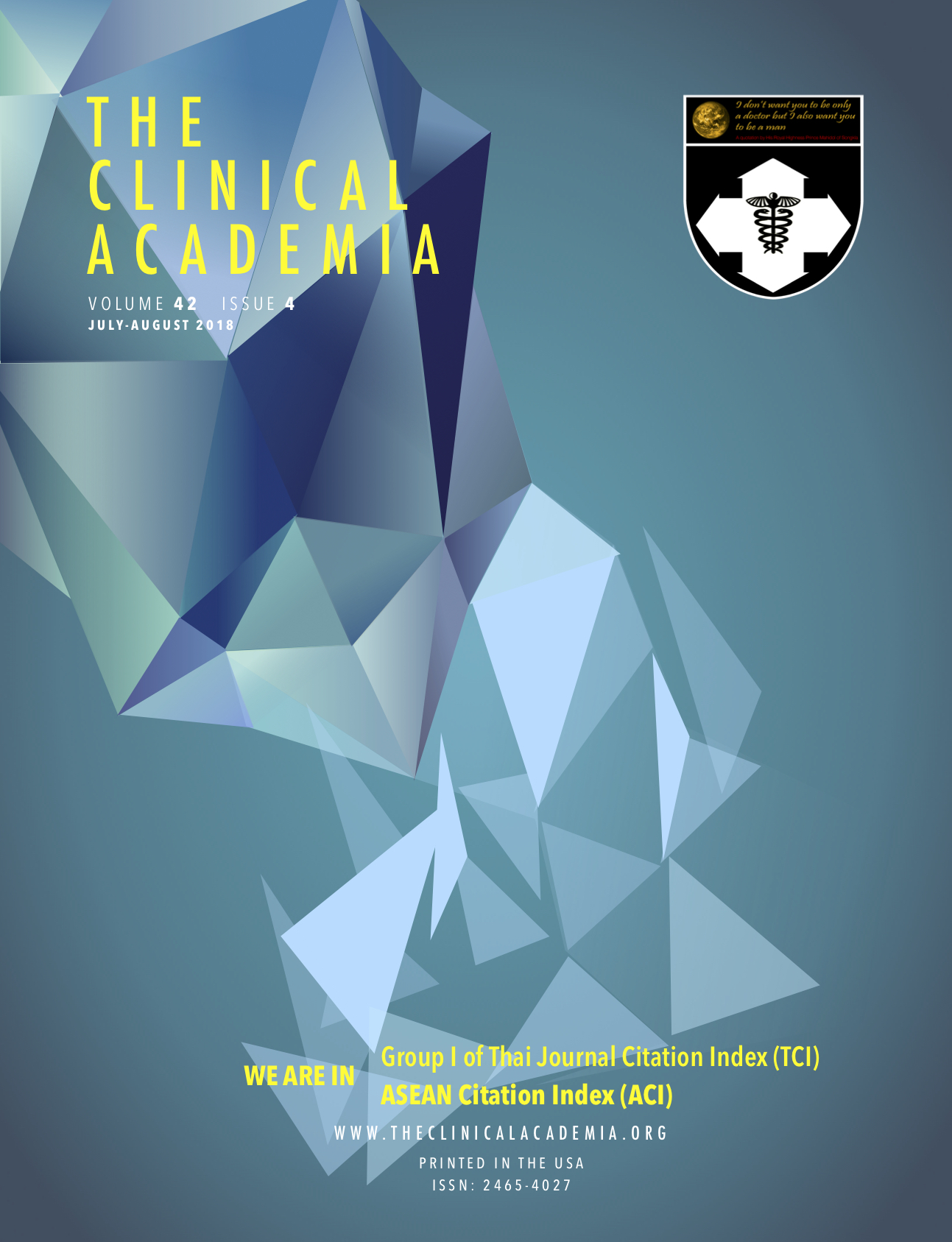
JULY-AUGUST
ปีที่ 42 ฉบับที่ 4 (2018)New evidence is coming to you inevitably. In this issue, you will the major predictor of post-intubation hypotension. You will also learn whether intravenous pantoprazole is better than omeprazole in term of rebleeding prevention after endoscopy. One of our original articles in this issue will inform you about the relationship between uncontrolled blood pressure and acute intracerebral hemorrhage in those with hypertension. There is also a systematic review of pentoxifylline and prednisolone for improving mortality in those with severe alcoholic hepatitis. Hope you find this evidence is helpful. Enjoy!
Thammasorn Jeeraaumponwat, M.D., Ph.D. Editor-in-Chief of The Clinical Academia
-
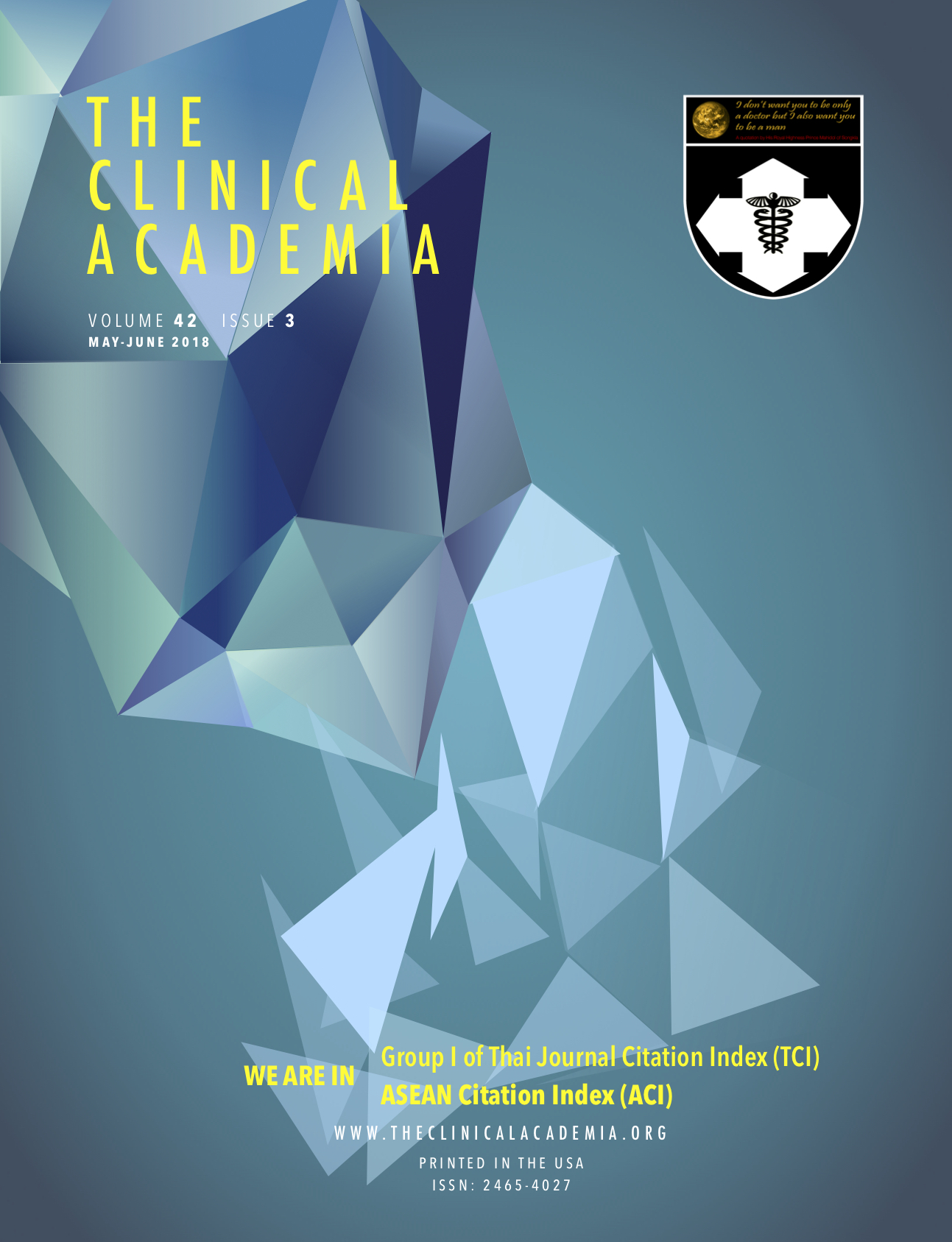
MAY-JUNE
ปีที่ 42 ฉบับที่ 3 (2018)In the era of evidence-based medicine, we are pushed to find evidence for every practice we do. To gather those evidence is incomparable to synthesize the evidence. This issue, TCA would like to present you two systematic reviews; one is from the combining of all relevant trials while another is from the observational studies i.e., cohort and case-control studies. These reviews are from doctors who once were the medical students at the Khon Kaen Hospital, Thailand. These reviews are parts of their research learning. Hope you find these evidence are helpful. Enjoy!
Thammasorn Jeeraaumponwat, M.D., Ph.D. Editor-in-Chief of The Clinical Academia

